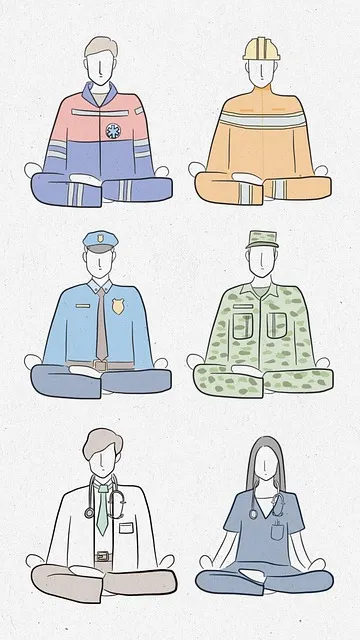The media's portrayal of mental health significantly shapes public perception, with positive representations reducing stigma and encouraging help-seeking behaviors. In communities like Colorado Springs, where Kaiser Permanente offers accessible services, accurate media depictions are crucial. Organizations like Kaiser Permanente can lead efforts to challenge stereotypes through podcasts, community engagement, and education initiatives, fostering empathy and destigmatizing mental illness. By integrating diverse narratives, involving individuals with lived experiences, and promoting well-being techniques, the media can enhance understanding while highlighting the importance of accessible mental health locations in Colorado Springs.
In today’s media landscape, representation of mental illness plays a pivotal role in shaping public perception. This article delves into the profound impact of media portrayal on understanding and attitudes towards mental health. We examine the current state of affairs, highlighting how media influences public opinion.
A case study focusing on Kaiser Permanente Colorado Springs serves as a shining example of positive change through innovative strategies. Additionally, we explore effective approaches like community engagement and education to foster accurate and empathetic mental health representation in media, drawing insights from leading organizations such as Kaiser Permanente mental health locations in Colorado Springs.
- Understanding the Impact of Media Portrayal on Mental Health Perception
- The Current State: How Does Media Affect Public Opinion on Mental Illness?
- Kaiser Permanente Colorado Springs: A Model for Positive Change
- Strategies to Enhance Accurate Mental Health Representation in Media
- Community Engagement and Education: A Collaborative Approach to Improvement
Understanding the Impact of Media Portrayal on Mental Health Perception

The media plays a significant role in shaping public perceptions about mental health, especially in communities like Colorado Springs where Kaiser Permanente mental health locations are accessible. Positive and accurate representation can foster understanding and reduce stigma, encouraging individuals to seek help. Conversely, negative or stereotypical portrayals can perpetuate misconceptions, leading to further marginalization of those with mental illnesses. This impact is profound, influencing how society views and treats individuals struggling with their mental well-being.
For instance, media often presents mental illness as monolithic, focusing on severe cases that might not reflect the diverse range of experiences. Such representations can make lesser-known conditions seem mysterious or even terrifying. However, awareness campaigns are challenging these narratives by promoting empathy and encouraging conversations around mental health. This shift is crucial for professionals in the field; a comprehensive Risk Assessment for Mental Health Professionals is essential to navigate complex situations effectively while prioritizing self-care routines for better mental health and boosted confidence.
The Current State: How Does Media Affect Public Opinion on Mental Illness?

The media plays a significant role in shaping public perceptions and understanding of mental illness. With billions of people consuming news, television shows, movies, and social media content daily, media representation can either perpetuate stereotypes or promote awareness and empathy. Unfortunately, historical portrayals of mental health conditions have often been inaccurate, leading to misconceptions and stigma. This has profound implications, especially in communities like Colorado Springs where organizations such as Kaiser Permanente offer vital mental health services.
Media’s influence on public opinion is powerful; it can either fuel the marginalization of individuals with mental illness or encourage much-needed conversations. Positive representation, including diverse narratives and accurate portrayals of treatment options, can foster a culture of understanding and support. Conversely, negative stereotypes can contribute to discrimination and hinder those in need from seeking help. Therefore, advocating for responsible media coverage, integrating Self-Care Practices, and implementing Community Outreach Program Initiatives are essential steps towards Mental Health Policy Analysis and Advocacy, ensuring that representations reflect the reality of mental health experiences.
Kaiser Permanente Colorado Springs: A Model for Positive Change

Kaiser Permanente Colorado Springs has emerged as a beacon of hope and positive change in mental health representation within the media. This organization is making significant strides by showcasing realistic and diverse narratives surrounding mental wellness through their innovative Mental Wellness Podcast Series Production. By sharing personal stories, they are breaking down stigma and promoting empathy, ensuring that individuals across the community feel seen and understood.
The approach taken by Kaiser Permanente goes beyond mere representation; it focuses on proactive solutions such as burnout prevention and effective communication strategies. Their efforts extend to various Kaiser Permanente mental health locations Colorado Springs, where healthcare professionals actively engage with the public, offering valuable resources and support. This comprehensive strategy is transforming the way mental illness is perceived and treated, leaving a lasting impact on the community’s overall well-being.
Strategies to Enhance Accurate Mental Health Representation in Media

Media has a significant influence on shaping societal perceptions and understanding of mental health issues. To ensure more accurate representation, various strategies can be implemented. One key approach is to involve individuals with lived experiences in the creative process, ensuring authentic storytelling. This includes hiring writers, directors, and actors who have personally dealt with mental health challenges, as they can offer valuable insights and prevent stereotypes.
Additionally, media outlets should collaborate with reputable organizations like Kaiser Permanente mental health locations in Colorado Springs, which specialize in promoting emotional well-being and providing resources. By partnering with these experts, media can access accurate information and incorporate effective Emotional Well-being Promotion Techniques into their content. Such collaborations can also help in highlighting the diverse range of mental health issues and their unique symptoms, fostering a more comprehensive understanding among audiences. Furthermore, focusing on Burnout Prevention and Confidence Boosting narratives can contribute to positive mental health representation by showcasing resilience and recovery.
Community Engagement and Education: A Collaborative Approach to Improvement

Community engagement and education are powerful tools in challenging the stigmatization of mental illness and improving representation in media. By fostering open dialogues, organizations like Kaiser Permanente in Colorado Springs can empower individuals to share their stories and experiences. This collaborative approach involves hosting events, workshops, and initiatives that educate both the public and mental health professionals about various aspects of emotional regulation and stress reduction methods.
The Mental Wellness Podcast Series Production, for instance, can be a creative platform to showcase personal journeys, provide practical tips, and offer expert insights. Such efforts contribute to a more nuanced understanding of mental health issues, encouraging empathy and support within the community. When individuals feel heard and understood, it paves the way for better representation in media, ultimately leading to improved access to care at local Kaiser Permanente mental health locations in Colorado Springs.
The representation of mental illness in media significantly influences public perceptions and understanding. By examining the current state of media coverage and implementing strategic changes, we can foster more accurate and compassionate views of mental health. Kaiser Permanente Colorado Springs serves as a notable example of how organizations can lead positive change through innovative approaches. Community engagement and education are essential tools to challenge stereotypes and promote support for individuals facing mental health challenges. By adopting diverse and authentic storytelling techniques, media outlets can contribute to a more inclusive and empathetic society, reflecting the reality of mental health struggles across various communities, including those in Kaiser Permanente mental health locations like Colorado Springs.






